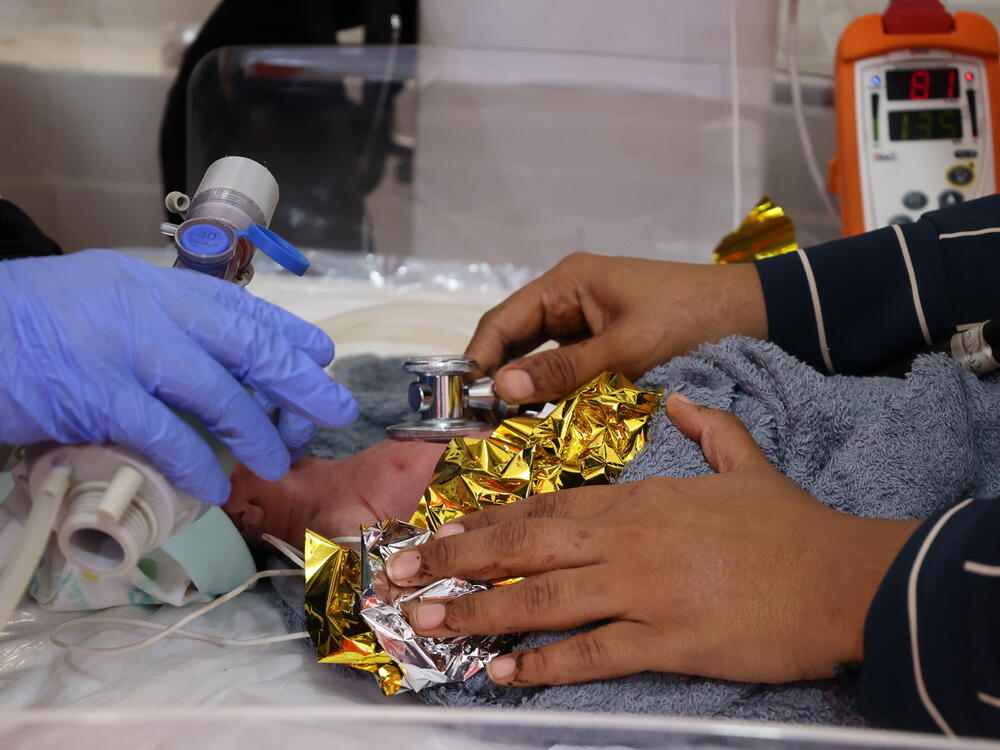Yemen: One hospital. One million people
Abs Hospital in Yemen is one of Médecins Sans Frontières / Doctors Without Borders (MSF) largest humanitarian projects worldwide.
Since 2015, our teams here have been supporting the hospital in the Hajjah governorate to treat people affected by the country’s brutal civil war.
However, Abs is the only hospital able to provide specialist treatment in a region of over a million people. And, with Yemen’s wider healthcare system already crippled by the conflict and humanitarian needs rising, the challenges have become stark.
Now, according to MSF, the high number of people seeking treatment at Abs Hospital has left staff and essential services overwhelmed.
Patients in Abs Hospital frequently have to share beds, and the emergency room, maternity unit, neonatal unit and feeding centre for malnutrition frequently operate at way more than 100 percent capacity.
At the same time, medical staff also deal with emergency responses to mass casualty events and disease outbreaks such as cholera, measles, diphtheria and COVID-19.
MSF teams say the hospital has now reached the limit of its capacity to respond.
“In response to the increase in patient numbers over the years, we’ve adapted our support to Abs Hospital by extending different departments, increasing bed capacity and consolidating human resources,” says Caroline Ducarme, Head of MSF in Yemen.
“This support to Abs hospital has become one of MSF’s biggest humanitarian responses worldwide, but today we have reached the limit of our capacity to respond, in terms of space, human resources and supply.”
A complex crisis
The increased demand on Abs Hospital’s services is due to several factors.
This includes the protracted conflict; the lack of affordable quality everyday healthcare services (which means that patients who would otherwise go to local clinics then arrive at hospital in a more advanced state); and the poor living conditions in camps for displaced people – including a lack of clean water and sanitation, leading to disease outbreaks.
Never miss an update
Get the latest news on war and conflict with our email newsletter, Frontline.
You'll also receive our best stories, critical updates and unique ways to get involved.
The situation was exacerbated in 2022 when funding cuts caused several healthcare providers to stop working in the Hajjah governorate and nearby Al Hudayda governorate.
As a result, services were discontinued at several health facilities, while others were left with insufficient medical supplies, increasing the pressure on Abs Hospital.
“Even though we have significantly developed our activities in Abs Hospital over the years, increasing bed capacity from 33 to 288, and supporting more than 80 percent of the hospital departments, we are still not able to cover everyone’s needs,” says Caroline.
The only hospital in the area
Abs Hospital is the only hospital for the around one million people in the region, and MSF is the only international organisation with a permanent presence in the area.
In 2022, MSF teams at Abs Hospital:
- Provided 79,325 emergency consultations
- Assisted 10,181 deliveries
- Cared for 3,095 newborn babies in the neonatal unit
- Treated 2,944 malnourished children in the feeding centre
- Performed 5,237 surgical interventions
- Treated 1,202 patients for malaria.
While MSF will continue to support Abs hospital in 2023, there is an urgent need for additional health organisations to step up and support the provision of medical care in the district, where people have a range of urgent health needs, including the risk of malnutrition and measles.
“The drastic impact of the protracted conflict on the health system in Yemen requires additional efforts from donor and humanitarian organisations to develop and strengthen the healthcare system to ensure that quality and affordable healthcare is accessible to all in Abs district, in Hajjah governorate and across Yemen,” says Caroline.
“Urgent action is also required from health authorities and humanitarian and development organisations to address the gaps in primary healthcare, to ensure timely access to medical care and to reduce risks of complications, which lead to an increased demand for secondary healthcare services.”
Since 2022, MSF has been working with the Ministry of Health to reorganise activities at Abs Hospital. This aims to improve the quality of care for the most vulnerable patients and those needing life-saving treatment while working to build up the public healthcare system for a more sustainable solution.
MSF and the crisis in Yemen
Yemen is in the middle of a civil war. Indiscriminate bombings and chronic shortages of supplies and staff have led to the closure of many of Yemen's health facilities.
More than three million people have been displaced since the war started in 2015. With an estimated 24 million in need of humanitarian assistance, our activities in Yemen are among our most extensive worldwide.
